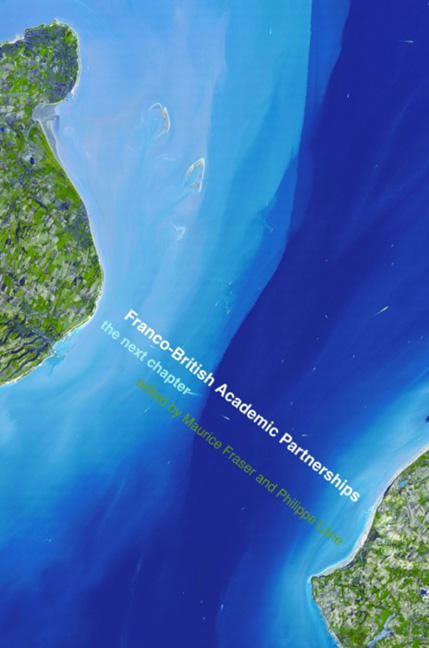Book contents
- Frontmatter
- Contents
- Notes on Contributors
- Foreword by His Excellency
- Foreword
- Preface
- Part I: Teaching and Training Partnerships
- Part II: Research Partnerships
- 12 Franco-British Academic Partnership: Perspective from Imperial College London
- 13 Sorbonne University's Franco-British Partnerships
- 14 The École Pratique des Hautes Études (EPHE), Paris: Research Collaboration Between Britain and France
- 15 International University Partnerships and the Role of the French Connection: The Experience of a London College
- 16 Maison Française d'Oxford: A Hub of Academic Cooperation for the Humanities and Social Sciences in Oxford
- 17 Multicultural London English/Multicultural Paris French
- 18 Franco-British Cooperation in the Social Sciences During a Period of Structural Reform: Current Positions and Prospects
- 19 The Publishing Industry and Research Perspectives
- Part III: Broader Perspectives
- Appendices: Addresses and Speeches at the Franco-British Academic Partnerships Seminar, French Institute, London, 5 February 2010
12 - Franco-British Academic Partnership: Perspective from Imperial College London
from Part II: Research Partnerships
- Frontmatter
- Contents
- Notes on Contributors
- Foreword by His Excellency
- Foreword
- Preface
- Part I: Teaching and Training Partnerships
- Part II: Research Partnerships
- 12 Franco-British Academic Partnership: Perspective from Imperial College London
- 13 Sorbonne University's Franco-British Partnerships
- 14 The École Pratique des Hautes Études (EPHE), Paris: Research Collaboration Between Britain and France
- 15 International University Partnerships and the Role of the French Connection: The Experience of a London College
- 16 Maison Française d'Oxford: A Hub of Academic Cooperation for the Humanities and Social Sciences in Oxford
- 17 Multicultural London English/Multicultural Paris French
- 18 Franco-British Cooperation in the Social Sciences During a Period of Structural Reform: Current Positions and Prospects
- 19 The Publishing Industry and Research Perspectives
- Part III: Broader Perspectives
- Appendices: Addresses and Speeches at the Franco-British Academic Partnerships Seminar, French Institute, London, 5 February 2010
Summary
Partnership and collaboration have always formed a strong part of the ethos of higher education institutions, both as providers of education and as research centres. As the market for education becomes more globalised, and students from across the world seek to receive an internationally excellent education which prepares them for a career in a variety of countries, the importance of international academic partnerships will continue to increase.
Imperial College London is consistently rated as one of the UK's and Europe's best universities. Focusing on Science, Engineering, Medicine and Business, the College has a reputation for excellence in both research and teaching. The College has a total of just over 15,500 students at both undergraduate and postgraduate level; the majority of these study full time. The College prides itself on the diversity of its student body and seeks to ensure that the most able students are recruited to its courses regardless of their background. The student body in 2010/11 was made up of students from 158 countries. Students from France form a strong part of the College community; in 2010/11, 4 per cent of incoming undergraduate and postgraduate students were French. France provides Imperial with more non-UK students than any other country apart from China.
Student Exchanges and ‘Study Abroad’ Programmes
Imperial's most long-standing and substantive academic associations with France are its exchange programmes. Currently, the majority of those for undergraduate students involve a full academic year of study. These programmes are highly desirable for many students, who report that an extended period of study outside their home country is an enjoyable experience. Along with the academic training that is provided during an exchange programme, students develop their confidence, social skills and language ability, all attributes which are extremely valuable in their future lives and careers. The College values these opportunities highly and encourages its students to undertake exchange programmes where possible.
There are, though, practical constraints which limit the number of opportunities which can be provided for a full academic year. In order to enable more students to benefit from the opportunity to undertake periods of study overseas, institutions may need to work to develop mechanisms to provide more short-term placements (e.g. lasting one semester).
- Type
- Chapter
- Information
- Franco-British Academic PartnershipsThe Next Chapter, pp. 99 - 106Publisher: Liverpool University PressPrint publication year: 2011

